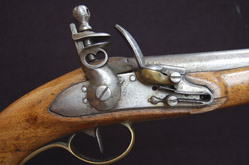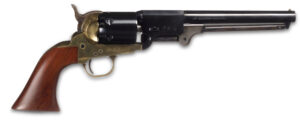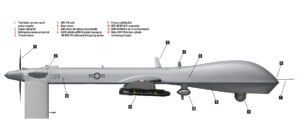
An extraordinary number of clichés have their origin in military terminology—many from terms associated with firearms. All three elements of a firearm are referred to in lock, stock, and barrel—the lock, or firing mechanism; the stock, or handle; and the barrel, or tube. In the early 1800s this expression came to mean the whole thing, or all of something. For a time “lock” and “stock” were interchanged (“stock, lock, and barrel”) but this usage died out. Today we would say, “He’s moved everything out of the house, lock, stock, and barrel.”
How stock phrases were born of gun talk
Not surprisingly many military-related clichés refer to early firearms, which were notoriously inaccurate. Not by a long shot has its origins in the late 1800s. At the time, a long shot was one fired from a distance, and given the primitive nature of firearms, such a shot rarely hit its target. By the late 1800s the term had been transferred to other improbabilities, such as a wild guess or a bet against considerable odds.
The flintlock musket gave us flash in the pan. Often an attempt to fire a gun would fail; there would be a flash in the pan holding the priming powder, but the main charge would not explode. The term eventually came to mean a promising start that never took off, as in: “Harry seemed like a good prospect for the team but he turned out to be just a flash in the pan.”
Hanging fire was also born of the flintlock. Over time, it came to mean something being delayed or undecided, as in: “The new advertising campaign is hanging fire until they decide on the budget.”
The failure of early firearms also gave us the expression going off at half cock (also put as to go off halfcocked). It dates from the early 1700s, when the hammer of a gun could be set halfway between the firing and retracted positions. The hammer occasionally slipped, setting off the gun unexpectedly. Over time the term came to characterize other premature action, as in: “Mary’s gone off halfcocked; she wasn’t supposed to start her solo till the chorus was finished.”
A more positive cliché derived from firearms terminology is to stick to one’s guns, meaning to hold fast to one’s course of action. Originally put as to stand to one’s guns, the expression alludes to a gunner remaining by his post, but it has been used figuratively since the mid-19th century. Thus: “The witness is bound to stick to his guns concerning the time of the robbery.”
The speed of a bullet inspired the simile like a shot, which since the late 1800s has been used to describe anything happening very quickly. For example: “When the teacher asked for volunteers, Paul’s hand went up like a shot.”
Two clichés seemingly related to firearms are of uncertain provenance. To give it one’s best shot would logically come from the military term “best shot,” which in the 1600s meant a soldier who could most accurately shoot. However, from about 1750 on, the noun “shot” also meant “an attempt,” which casts some doubt on the cliché’s origin. Regardless, it still means to give something one’s hardest try.
The second cliché of mysterious origin is the whole nine yards, meaning the entire thing, or everything that is relevant. Theories about its provenance include that it comes from the amount of fabric needed for a suit of clothes; the fully set sails of a three-masted ship where each mast carries three yards; or the cubic yards of cement required in a cement mixer for a big construction job. Still another theory suggests the phrase refers to the nine-yard belt of .50-caliber ammunition used in American aircraft in World War II.
Finally, the cliché lock and load dates from about 1940. Originally a command to lock a firearm via its safety and load it with ammunition, the expression is now used to describe preparing for action of any kind. For example: “Have you packed the trunk yet? If so, let’s lock and load for the beach.”
Christine Ammer has written several dozen word books, including Facts on File Dictionary of Clichés (3rd ed., November 2011) and American Heritage Dictionary of Idioms.





